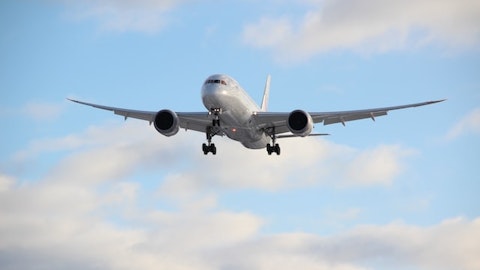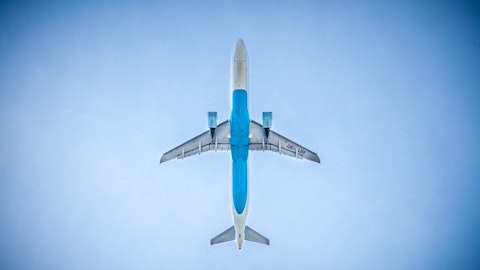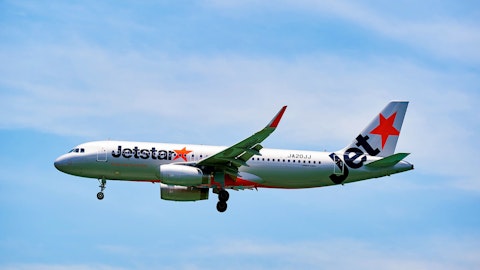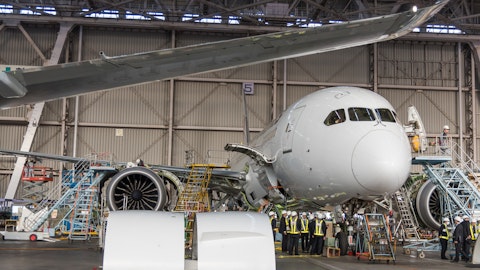Louie DiPalma: Great. And one last one for Kevin, do you expect SoftBank — or for both of you, do expect SoftBank to continue funding HAPS? And is AeroVironment prepared to continue funding HAPS and Sunglider on its own if SoftBank drops out?
Wahid Nawabi: Sure. So A, SoftBank is very committed to this program. We are working with them very closely. They continue to fund us although the funding for them has reduced slightly because of their financial situation over the last couple of years. There’s a much bigger discussion and known variables in the Japan’s economic situation in the pandemic et cetera that’s affecting that. Number one, that’s the underlying reason. So — however, SoftBank is very committed to us. We’re actively engaged with them. We’re dial — we’re talking to them all the time, very regularly. And we’re progressing that process. So I do not expect them to start funding our Sunglider anytime soon. They’re committed to the mission. They still believe in the platform and we believe in the long-term value proposition perhaps.
It’s just that they have intentionally slowed down over the last two years because of the overall macroeconomic situation that they are faced with. Secondly, we are funding it with some small amount primarily because there is IP involved, and we would like to make sure that we own and we look to protect. We’ve always done that and we’ll continue to do that. And lastly, we have received our initial contract award from the U.S. DoD and there is additional funding a significant amount of funding actually relatively speaking, and the government fiscal year ’24 budget for HAPS and the U.S. DoD budget. So, when the government fiscal year ’24 budget is approved, we expect that eventually to transition into a contract AeroVironment and we’re actively working this program with the U.S. DoD, there’s very strong support and desire for this capability in the U.S. DoD as well.
Louie DiPalma: Excellent. Thanks, Wahid. Thanks, Kevin and Jonah as well.
Wahid Nawabi: You’re welcome, Louie.
Kevin McDonnell: Thanks, Louie.
Operator: Thank you. One moment for our next question. And our next question is a follow-up from Ken Herbert from RBC Capital Markets. Your question, please.
Ken Herbert: Yeah. Hi, good afternoon. I just wanted to follow up on the EPS guidance. I mean, you did just under $2 in adjusted EPS in the first half. The guidance implies, $0.60 to $0.70 in the second half of the year at the upper end of the range. Aside from mix as you really ramp Switchblade sales, is there anything else in particular of the EPS that’s sort of driving the significant step down first half to second half?
Kevin McDonnell: We definitely expect a step up in R&D in the second half of the year. So that’s going to be part of the equation there for the EPS. So you’re going to see a little bit lower margins, you’re going to see a step-up of the R&D expense in the second half.
Ken Herbert: Okay. So mix in R&D I guess would be how we should think about that.
Kevin McDonnell: Yeah. That’s right. Normally, our years are all reversed around. So there’s a little bit of a backwards here.
Wahid Nawabi: Yeah. And as I’ve said to Ken on my remarks, as you saw, we have an exciting number of other programs and projects where there’s a lot of demand for those systems including the DARPA ancillary, the SOAR program with the U.S. Army and with the OSB for large contested logistics capability, those programs are getting a lot of traction. And we do not want to slow down those efforts and make sure that even though if there is a continuing resolution we accelerate those things because the desire and demand by the U.S. DoD for those capabilities is very high. And we also believe that we’re very unique in the sense that our solutions are considered the most innovative and the most capable in these categories that the U.S. duty is feeling very strongly about. So we’re going to expect to actually ramp up R&D investments in the second half to support those developments in order to fuel our future growth and share — shareholder value creation.
Ken Herbert: Okay. Great. Appreciate it. Thanks, Wahid and Kevin.
Wahid Nawabi: You’re welcome.
Operator: Thank you. This does conclude the question-and-answer session of today’s program. I’d like to hand the program back to Jonah for any further remarks.
Jonah Teeter-Balin: Thank you once again for joining today’s conference call and for your interest in AeroVironment. As a reminder, an archived version of this call, SEC filings and relevant news can be found under the Investors section of our website. We wish you a good evening and look forward to speaking with you again following next quarter’s results.
Operator: Thank you, ladies and gentlemen, for your participation in today’s conference. This does conclude the program. You may now disconnect. Good day.
Follow Aerovironment Inc (NASDAQ:AVAV)
Follow Aerovironment Inc (NASDAQ:AVAV)
Receive real-time insider trading and news alerts





